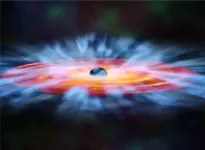(Press-News.org) The impact of solar radiation on skin has long been understood but what about UV’s effects on our skin's hidden world – its microbiome?
An article from American Society for Photobiology’s journal delved into existing knowledge on solar radiation’s impact on the skin microbiome and proposed innovative sun protection methods that safeguard both skin integrity and microbiome balance.
Experts offered insights into novel sun protection products designed to shield the skin and mitigate the effects of solar radiation on the skin microbiome. Solar radiation exposure can alter microbiome composition, potentially leading to dysbiosis (an imbalance in the microbiome), compromised skin barrier function, and immune system activation.
Current sun protection methods generally overlook microbiome considerations. Tailored sun protection products that prioritize both skin and microbiome health may offer enhanced defense against solar radiation-induced skin conditions.
Key findings include:
The incorporation of topical sunscreens with film-forming properties not only offers effective sun protection but also enhances the skin barrier, potentially aiding in the preservation of a healthy microbiome by reducing the penetration of harmful UV radiation and environmental stressors.
Novel sun-protecting products containing pre and probiotics and other beneficial ingredients may potentially help to protect the skin microbiota from SR damages and help to limit the exposome-induced immunosuppression of the host.
There is evidence that UVR destroys substances such as porphyrins which are absorbed in the long UVA range and especially in the visible range and which are produced by several microorganisms including the skin commensal Cutibacterium acnes and Pseudomona aeruginosa. Thus, UVR may impact the skin microbiome composition leading to dysbiosis and an altered skin barrier. END
New study explores the sun’s effects on the skin microbiome – it can create a damaged skin barrier
2024-06-11
ELSE PRESS RELEASES FROM THIS DATE:
States declare May 17 as NEC Awareness Day
2024-06-11
The NEC Society is leading the way toward a world without necrotizing enterocolitis (NEC), a complex and often deadly intestinal disease affecting the most vulnerable infants. By bringing together families and elected officials, the NEC Society is raising the profile of this devastating neonatal disease. States nationwide have championed NEC Awareness Day Resolutions to recognize May 17.
The NEC Society’s families have partnered with elected officials to declare May 17 NEC Awareness Day in California, Colorado, Georgia, Louisiana, New York, Pennsylvania, and Utah, bringing much-needed attention to this leading cause ...
Precision medicine for sepsis in children within reach
2024-06-11
Sepsis – the leading cause of mortality in children around the world – can present with a wide range of signs and symptoms, making a one-size-fits-all treatment strategy ineffective. Pursuing a precision medicine approach for pediatric sepsis, researchers used artificial intelligence to analyze a large set of clinical data and find a distinct group of patients who might respond better to targeted treatments.
These children share clinical characteristics described as PHES, or persistent hypoxemia (abnormally low oxygen ...
New ACAAI position paper examines safety of receiving live vaccines while on dupilumab
2024-06-11
ARLINGTON HEIGHTS, Ill. (June 11, 2024) – A new position paper from the American College of Allergy, Asthma & Immunology (ACAAI) addresses the safety of administering live vaccines to patients who are currently being treated with dupilumab, a biologic therapy for various allergic conditions. The paper, The Use of Vaccines in Patients Receiving Dupilumab: A Systematic Review and Expert Delphi Consensus Recommendation: A Position Paper of the American College of Allergy, Asthma & Immunology, is published online in Annals of Allergy, Asthma & Immunology, ACAAI’s scientific journal. The panel conducting ...
St. Bernard Parish Hospital included among Becker’s 100 Great Community Hospitals
2024-06-11
CHALMETTE, La. – St. Bernard Parish Hospital (SBPH) has been named one of the 100 Great Community Hospitals in 2024 by Becker’s Hospital Review. This marks the second consecutive year St. Bernard Parish Hospital has earned the honor of being named a Great Community Hospital.
Many hospitals included on this year’s list have been recognized by rankings and rating organizations for their excellent clinical care, outstanding patient outcomes, and high performance in specialty services. Becker’s ...
Texas A&M receives grant from Inflation Reduction Act
2024-06-11
Texas A&M has been announced as a recipient of a $1.5 million grant from the Inflation Reduction Act to address climate-damaging hydrofluorocarbons.
The grant is among the five projects funded by the United States Environmental Protection Agency (EPA) totaling $15 million and includes three other universities: the University of Washington, Drexel University and the University of California- Riverside, along with the Air Conditioning, Heating and Refrigeration Institute.
Dr. Faruque Hasan, associate ...
Texas A&M researcher receives grant for work on phase separation
2024-06-11
Chemical engineering professor Dr. Jeetain Mittal has received a National Institutes of Health grant to support his work on phase separation.
Mittal’s research focuses on developing a multiscale computational framework to investigate the role of phase separation in biology, particularly in the formation of heterochromatin. Heterochromatin condensates are membraneless organelles that help control gene expression.
A key aspect of the proposal is the role of phase separation in chromatin organization, highlighting the need for new models in this area. Mittal’s ...
Wind from black holes may influence development of surrounding galaxies
2024-06-11
Clouds of gas in a distant galaxy are being pushed faster and faster — at more than 10,000 miles per second — out among neighboring stars by blasts of radiation from the supermassive black hole at the galaxy’s center. It’s a discovery that helps illuminate the way active black holes can continuously shape their galaxies by spurring on or snuffing out the development of new stars.
A team of researchers led by University of Wisconsin–Madison astronomy professor Catherine Grier and recent graduate Robert Wheatley revealed the accelerating gas using years of data collected from a quasar, a particularly ...
Impact Journals sponsors 2024 Ride for Roswell
2024-06-11
Impact Journals is thrilled to sponsor Team Open Access again in the annual cycling event to end cancer, The Ride for Roswell, on June 22, 2024.
BUFFALO, NY- June 11, 2024 – The Ride for Roswell is one of the nation’s largest cycling events—hosted by Roswell Park Comprehensive Cancer Center—to raise awareness and funds for cancer research and patient care. This charity bike ride, based out of Buffalo, New York, has brought people together for 28 years to celebrate cancer survivors, pay tribute to lives that have been lost, and to work together to support research and find a cure.
THE ORIGIN OF THE RIDE
The Ride for Roswell started ...
Safer virus helps eliminate cancer
2024-06-11
· Weakened virus helps eliminate melanoma and colon cancer in mice
· Therapy is effective in treating and even preventing cancer
· Virus raises ‘red flag’ on tumors so immune cells know to attack it
CHICAGO --- Northwestern Medicine scientists have discovered that an attenuated (weakened) virus can help eliminate cancer in mice. In addition, mice that were treated with this virus were more resistant to developing tumors later in life.
The attenuated virus — lymphocytic ...
Mizzou scientists spot more Milky Way-like galaxies in early universe
2024-06-11
University of Missouri scientists are peering into the past and uncovering new clues about the early universe. Since light takes a long time to travel through space, they are now able to see how galaxies looked billions of years ago.
In a new study, the Mizzou researchers have discovered that spiral galaxies were more common in the early universe than previously thought.
“Scientists formerly believed most spiral galaxies developed around 6 to 7 billion years after the universe formed,” said Yicheng Guo, an associate professor in Mizzou’s ...





